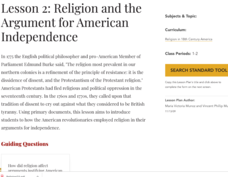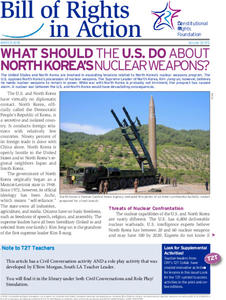What So Proudly We Hail
Life, Liberty, and the Pursuit of Happiness: A Lesson on the Declaration of Independence
What does it mean to say that a right is unalienable? How did the founding fathers convey this revolutionary concept in the Declaration of Independence? Engage in a close reading and analysis of the Declaration of Independence, and...
National Endowment for the Humanities
Lesson 2: Religion and the Argument for American Independence
Young scholars examine how religion affected arguments justifying American independence. They read and analyze primary source documents, and write an essay analyzing how Americans used religious arguments to justify revolution against a...
National Endowment for the Humanities
Lesson 1: The First Great Awakening
High schoolers examine the First Great Awakening and how it affected religious belief in colonial America. They read and analyze primary source documents, explore various websites, and write a five-paragraph essay examining the beliefs...
Center for History Education
Debating Social Security: Understanding and Evaluating the Social Security Act of 1935
With throngs of Americans out of work and hungry, Franklin D. Roosevelt made the bold move to establish a social safety net with programs such as Social Security. The move was—and still is—controversial. Using documents from the 1930s,...
Center for History Education
The Freedmen's Bureau: Success or Failure?
What is freedom? The United States grappled with the question at the end of the Civil War after four million enslaved people were freed. Using circulars and images from the Reconstruction period, individuals examine how successful the...
National Endowment for the Humanities
Imperialism and the Open Door
After the United States emerged as a global power, it began to muscle its way into trading agreements with China. Using primary sources, budding historians examine the Open Door policy, which emerged during this time. Primary sources and...
National Endowment for the Humanities
Creating the Office of the Presidency
The United States needed an executive power, but it wanted to avoid a monarchy. Using James Madison's notes on the Constitutional Convention, young historians look at the juggling act the Founding Fathers did to create a role for the...
National Endowment for the Humanities
The Question of Representation at the 1787 Convention
While the Constitution is considered enshrined today, its current form is the result of haggling at a secret convention in 1787. Using transcripts from the meetings and various plans as drafted by the delegates, class members unpack the...
Constitutional Rights Foundation
What Should the US Do About North Korea's Nuclear Weapons?
North Korea, a shadowy nation distrustful of America, is working on a nuclear weapons program. What should the United States do? The question has plagued American presidents for years, but now young scholars get to make their...
iCivics
DBQuest: The Nashville Sit-In Movement
What was it like to be a part of the sit-ins during the Civil Rights Movement? Learners consider the question and whether the protests were effective using an online documents-based investigation. The program allows for virtual...
Cornell College
Dred Scott v. Sandford Supreme Court Decision
Dred Scott was a harbinger of the Civil War. An enslaved man claimed freedom because his owner had taken him into free territory. Not only did the Supreme Court rule that Dred Scott and his wife were to remain enslaved, but it also ruled...
Curated OER
Centers of the Storm: The Lyceum and the Circle at the University of Mississippi
Greek Revival architecture and the Civil Rights Movement? Sure! Examine how the Lyceum and Circle, two historic buildings located on the campus of the University of Mississippi, relate to integration and the 1962 riot on the university...
National Endowment for the Humanities
The Debate in the United States over the League of Nations: Five Camps: From Voices of Consent to Voices of Dissent
Students explore and discuss Woodrow Wilson's concepts for peace and the League of Nations. They understand efforts made to foster American support for the League and discuss the opposition shown in the Senate.
National Endowment for the Humanities
Slavery and the American Founding: The "Inconsistency Not to Be Excused"
High schoolers examine slavery in the revolutionary and colonial eras of the United States. In this slavery lesson, students investigate the presence of slavery in early America, the language of the Constitution, and the intent of the...
National Endowment for the Humanities
Lesson 3: Religion and the Fight for American Independence
Pupils explore the role religion played in the American Revolutionary War. Using primary documents and writing exercises, students understand how religion was used in support of the war efforts and how specific religious groups responded...
National Endowment for the Humanities
Lesson 2: The Debate in Congress on the Sedition Act
Pupils research and discuss the provisions in the Constitution that supported the arguments for and against the Sedition Act. They articulate objections to and arguments in favor of the Sedition Act.
National Endowment for the Humanities
Chinua Achebe's Things Fall Apart: Oral and Literary Strategies
Readers are first introduced to Chinua Achebe's Things Fall Apart by making a map of Africa. They will better understand the novel's historical and literary contexts, European and African literary traditions, and how historical events...


















